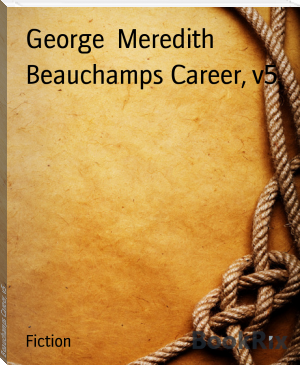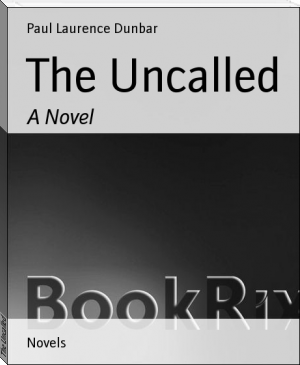Both Sides the Border: A Tale of Hotspur and Glendower by G. A. Henty (literature books to read .txt) 📗

- Author: G. A. Henty
Book online «Both Sides the Border: A Tale of Hotspur and Glendower by G. A. Henty (literature books to read .txt) 📗». Author G. A. Henty
An important meeting was held at Alnwick, at which the Scottish nobles, the Earl of Northumberland, and Hotspur were alone present, and here matters of vital interest to the kingdom were arranged.
For six months things remained in the same state. The king's fourth expedition into Wales had effected no more than the preceding. Glendower was still virtually master of Wales. Cardiff had been burned by him, with its numerous priories and convents, with the exception of that of the Franciscans; the castle of Penmarc, and the town and castle of Abergavenny had been burned, and other strong places captured.
The Percys remained, during this time, sullen and inactive; although somewhat mollified by the thanks voted them by Parliament. The king, as a reward for their services, bestowed upon them the estates of Douglas. This, however, they treated with scorn, for as well might he have presented to them the city of Naples or Paris; since, unless all Scotland was conquered, they could not come into peaceful mastership of the Douglas estates. Nor, indeed, could the king have intended it in earnest; for he was far too politic to think of adding so great an increase of territory to the estates of the Percys, who had already shown their power by placing him on the throne, and who might some day take back what they had given him, by declaring in favour of the Earl of March.
One day in February, 1403, Oswald was summoned from Stoubes to Alnwick and, on his arrival there, was requested to go to the earl's chamber. Such a summons was extremely unusual. Hotspur had his own estates, and his own retinue and following; and was, jointly with his father, warden of the marches; and though he dwelt, generally, with him at Alnwick, he had his own portion of the castle. Thus it was seldom that the earl had any communication with Hotspur's knights.
Hastening to obey, Oswald found Hotspur with his father.
"I have a mission for you, Sir Oswald," Hotspur said, "on the part of the earl and myself. You know that, for a long time, there has been a disputation between my father and the Earl of Westmoreland, respecting the Scottish prisoners. The earl sent a small force to fight under me at Homildon, but it was a mere handful; and on the strength of this he advanced a claim to a considerable share of the ransoms of the prisoners; or, since they could not be ransomed, to the custody of the persons of the Earls of Moray and Angus. The king has now, contrary to all reason, inflicted upon us the indignity of appointing four commissioners, two of whom are but knights and the other two men of no consequence, to inquire into the question between my father and my uncle, the Earl of Westmoreland.
"Does he think that two of his earls are going to submit themselves to so gross an indignity?--we, who are as much masters in the north of England as he is in the south--and even that he owes to us. I have ridden over and seen Westmoreland, who is as indignant as we are, and we at once arranged the little matter in which we are at variance, and agreed upon common measures.
"But this is not all. Seeing that the king absolutely refused to do to Mortimer the same service that he did to Lord Grey, whose ransom he has now paid--and who, by the way, has married Glendower's daughter, Jane--Mortimer's vassals, with some aid from ourselves, have raised the money required to free Mortimer. Now the king has interfered, and has given orders that such ransom shall not be paid. 'Tis evident that he determines to drive us to extremities.
"I tell you these things, in order that you may see how intolerable the condition of affairs has become. My father and myself believe that it is the judgment of heaven upon us, for having helped to dethrone King Richard, the lawful sovereign of this country, and to place this usurper on the throne. Even had Richard's conduct rendered his deposition necessary, we did wrong in passing over the lawful heir, the young Earl of March. 'Tis true he was but a child, at that time; but he is older now, and we feel shame that he should be kept as a prisoner, by Henry. Had not the king perjured himself, we should not have been led into this error; for, before we assisted him, he swore a great oath that he had no intention of gaining the throne, but only to regain his own dukedom of Lancaster. It was on that ground that we lent him our aid; and now, forsooth, this perjured usurper treats us, who made him, as dirt under his feet!
"We are resolved to suffer it no longer; and since we may not ransom Mortimer, we will secure his freedom in other ways, and for this you may give us your aid."
"Assuredly, Sir Henry, and my Lord Earl," Oswald, who was deeply indignant at the unworthy treatment of his lords, replied hotly. "My life is at your service."
"I expected nothing else," Hotspur said, warmly. "The matter stands thus. Owen Glendower was a warm partisan of King Richard, and was one of the few who remained faithful to the end; thereby incurring the deep hostility of Henry, and of his adherent Lord Grey. It was for this his lands were unjustly seized, for this that Henry's parliament refused to accede to his complaints, and so drove him to take up arms. Thus, then, in an enterprise against Henry, Glendower is our natural ally; and we intend to propose to him that alliance, undertaking that, if he will give us aid, his claim to the crown of Wales shall be acknowledged, and that he shall govern his country without interference from England.
"There is none who could carry out this negotiation so well as yourself, since you can, by virtue of that ring he gave you, pass unarmed to him; while any other knight would be assuredly slain. You will bear a letter, signed by the earl and myself, offering him our friendship and alliance, on those terms; and explain to him, more fully, the manner in which we have been driven to throw off Henry's authority. You can tell him that we shall proclaim the Earl of March lawful king; and if he agrees to join in our project, which would be clearly both to his liking and advantage, it would be as well that he should, as soon as we move, which may not be for some time yet, release Sir Edmund Mortimer; who, as the boy's uncle, will assuredly raise his vassals on his behalf, now that Henry has shown such animosity against him."
"I will gladly undertake the mission, my lord; and all the more gladly, since it may lead to the liberation of Sir Edmund Mortimer, who treated me with the greatest kindness and condescension, during my stay at Ludlow."
"Prepare to start tomorrow, then," the earl said. "The letter shall be ready for you tonight; and beyond what my son has told you, you can tell Glendower that we have good hopes of large help from Scotland; with whom, it is said, he is already in alliance."
The next morning Oswald started, taking no one but Roger with him. He had, the evening before, told his squire only that he was starting on a journey; promising to tell him more, as they rode. Accordingly, when well away from Alnwick, he beckoned to Roger to bring up his horse alongside of him.
"Where think you that we are going, Roger? I will give you fifty guesses, and would warrant that you would not come at the truth."
"It matters nothing to me, master; so that I ride with you, I am content."
"You know, Roger, how grievously the king has treated the Percys; how he has prevented their taking ransom for their prisoners, and has refused to ransom Sir Edmund Mortimer; how he, in bitter jest, offered the earl the estates of Douglas; and how he has put upon them the indignity of sending four men, of no import, to decide upon their difference with Westmoreland?"
"Ay, ay, Sir Oswald, everyone knows this, and not a few have wondered that the Percys have suffered these things, in quietness."
"A fresh thing has happened, Roger. The tenants of Mortimer, with aid from the earl and Hotspur, have raised the sum that Glendower demanded as ransom; and now the king has laid on them his order, that this money is not to be paid."
"By our Lady," Roger exclaimed wrathfully, "this is too much! Sir Edmund is a noble gentleman, and that the king should refuse to allow his friends to ransom him passes all bounds."
"So the earl and Hotspur consider," Oswald said, "and, ere long, you will see that they will hoist the banner of the young Earl of March, and proclaim him King of England."
"'Tis good," Roger exclaimed, slapping his hand on his leg. "To me it matters nought who is King of England, but I always held that it was hard that King Richard should be deposed, and murdered, by one who was not even his lawful successor. I am not one to question the conduct of my lord, but I always thought that the Percys were wrong in bringing this usurper over."
"They feel that themselves, Roger, and consider the ingratitude of the king to be a punishment upon them, for having aided him to the throne."
"But what has this to do with your journey, master?"
"It has much to do with it, Roger, seeing that I am on my way to Glendower, to offer him alliance with the Percys."
"A good step!" Roger exclaimed. "We know that these Welsh can fight."
"Moreover, Roger, it may bring about the freeing of Mortimer; for the evil feeling the king has shown against him will surely drive him to raise all his vassals, and those of the young earl, in Herefordshire and elsewhere; and thus the Percys will gain two powerful allies, Glendower and Mortimer; and as they advance from the north, the Welsh and Mortimer will join them from the west. When victory is gained, there will be peace on the Welsh marches. Owen will be recognized for what he is, the King of Wales; and doubtless he will then suffer the English to live quietly there, just as the Welsh have lived quietly in England.
"Then, too, all the western counties will see that it is their interest to side with Mortimer and Glendower. Four times, during the last three years, have they been called out, and forced to leave their homes to follow the king into Wales; and as often have had to return, leaving behind them many of their number. They will see that, if Glendower is acknowledged King of Wales, this hard and grievous service will no longer be required of them."
"That is so, Sir Oswald, and in truth I like the project well. It matters not a straw to me who is king; but if a king treats my lords scurvily, I am ready to shout 'Down with him!' and to do my best to put another up in his place; though, indeed, 'tis a salve to my conscience to know that the man I am fighting against is a usurper, and one who has set himself up in the place of the lawful king."
"My conscience in no way pricks me, Roger. I fight at my lord's order, against his foes. That is the duty I have sworn to. As between him and the king, 'tis a matter for him alone. At the same time, I am glad that the business is likely to end in the rescue of a knight who has been very kind to me. Between Henry and the young Earl of March I have no opinion; but it seems to me that, since Henry ascended to the throne by might, and by the popular voice, he has no cause to complain, if he is put out of it by the same means."
"But, should the war go against the Percys, master?"
"That, again, is a matter for the earl and Hotspur. They know what force they and the Earl of Westmoreland can put in the field. They know that Glendower can aid with ten thousand Welshmen, and that Mortimer can raise three or four thousand men from his vassals. They should know what help they can count on from Scotland; and doubtless, during the last six months, have made themselves acquainted with the general feeling respecting the king. It is upon them that the risk chiefly falls. We knights and men-at-arms may fall in the field of battle; but that is a risk that we know we have to





Comments (0)